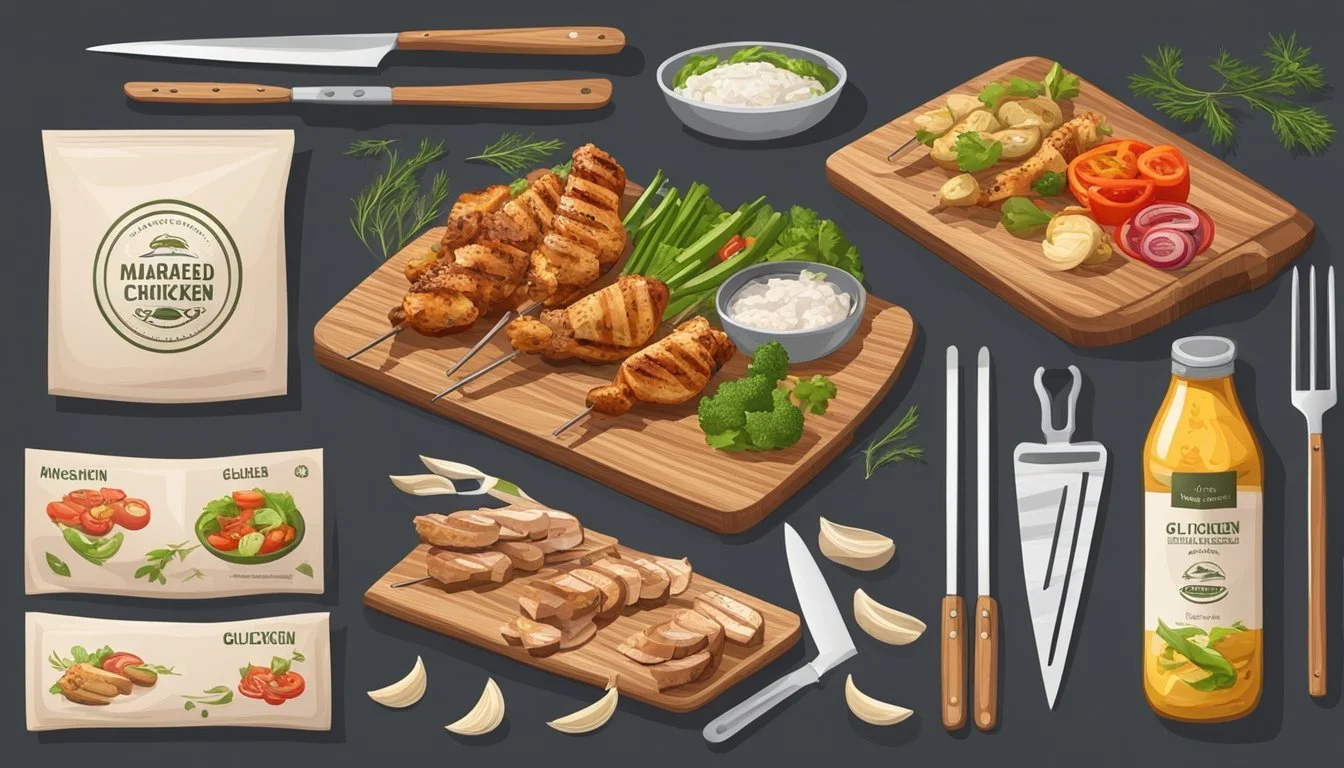Is Chicken Kebab Gluten-Free?
Debunking Common Myths
Determining whether chicken kebab is gluten-free depends on its ingredients and preparation methods. Chicken kebabs can easily be made gluten-free since the main component, chicken, is naturally devoid of gluten. However, the marinades and seasonings used in the preparation often contain gluten-rich ingredients like soy sauce or commercially prepared mixes with additives. To ensure a gluten-free option, it's crucial to evaluate every ingredient, including any sauces or condiments that accompany the kebabs.
Many recipes and commercial options for chicken kebabs now cater to gluten-free diets. They employ alternatives such as gluten-free soy sauce or tamari, and clearly mark gluten-free labels on packaging. For those preparing chicken kebabs at home, using fresh herbs, spices, and gluten-free condiments is a reliable way to maintain a gluten-free meal. Additionally, when serving, one should also consider potential cross-contamination with gluten-containing products, which is especially important for individuals with celiac disease or gluten sensitivity.
Understanding Gluten-Free Diets
When embarking on a gluten-free diet, one needs to understand the basis of what it means to live without gluten, the benefits this diet can have for certain individuals, and the common foods that are typically avoided.
Defining Gluten-Free
Gluten-free refers to a diet that does not include gluten, a group of proteins found primarily in wheat, barley, and rye. This means that any foods or ingredients derived from these grains must be excluded from a gluten-free diet. For a product to be labeled as "gluten-free," it must contain less than 20 parts per million (ppm) of gluten, which is the safe threshold for most people with gluten-related disorders.
Benefits of Gluten-Free Eating
The primary benefit of a gluten-free diet is the management of celiac disease, a serious autoimmune disorder where gluten intake causes damage to the small intestine. Individuals with non-celiac gluten sensitivity also report a reduction in symptoms such as bloating, abdominal pain, and headaches when following a gluten-free diet. For those with these conditions, eating gluten-free can lead to better overall health and well-being.
Common Gluten-Containing Foods
A variety of foods traditionally contain gluten, which individuals on a gluten-free diet need to avoid. These include:
Breads and Baked Goods: Often made from wheat flour, which is high in gluten.
Pasta: Typically consists of wheat-based dough, making it a gluten-rich food.
Cereals: Many are made from wheat, barley, or rye.
Adherence to a gluten-free diet requires careful label reading and awareness of potential cross-contamination in food processing.
Essentials of Chicken Kebab
Chicken kebabs are a delicious and versatile dish that combine marinated chicken pieces with a variety of spices and can be cooked on a grill. Getting the basics right with the right ingredients for the marinade ensures a flavorful and enjoyable meal.
The Basics of Chicken Kebab
Chicken kebabs involve skewering marinated chicken, often with vegetables like onions, and grilling them to perfection. The key to a successful chicken kebab is in the quality of chicken used; typically, chicken breast (What wine goes well with chicken breast?) is cut into large chunks for even cooking. Skewers can be either metal or wooden, but if wooden skewers are used, they should be soaked in water to prevent burning on the grill. The process is known for being straightforward and easy to make, resulting in a meal that is both delightful and satisfying.
Marinade Ingredients
A marinade is crucial to infuse the chicken with flavors and tenderize it. A typical marinade for chicken kebabs might include:
Oils: Olive oil is the standard choice, providing a rich base for the marinade.
Acids: Lemon juice or vinegar for brightness and tenderness.
Dairy: Yogurt can tenderize and add a creamy texture.
Spices and Herbs: A combination of spices such as paprika, rosemary, or oregano adds depth, while garlic enhances the savory notes.
Sweeteners: Honey might be used as a sweetener to balance the flavors.
Seasonings: Salt and pepper are essential for seasoning; additional ingredients like soy sauce or mustard can be added according to the recipe.
The marinade should be mixed well and used to coat the chicken thoroughly before it is left to marinate, often for a few hours or overnight to allow the flavors to penetrate deeply.
Gluten-Free Kebab Preparation
Preparing gluten-free chicken kebabs involves ensuring all ingredients, including the marinade and chicken, are free of gluten-containing elements. Proper techniques in marinating and grilling contribute to flavorful and safely gluten-free kebabs.
Choosing the Right Chicken
For the healthiest option, individuals should select skinless chicken breast. It's lean and ideal for cutting into kebab-sized chunks. Ensuring the chicken is fresh and of good quality is paramount for a delicious outcome.
Preparation of Skewers
Wooden or bamboo skewers need to be prepared correctly to prevent burning. Soaking them in water for at least 20 to 30 minutes before grilling is a critical step. This helps the skewers to not char excessively when exposed to high heat.
Marinating Chicken
A gluten-free marinade can be made by combining ingredients like olive oil, garlic, spices, and herbs. Ensure that any added sauces or condiments are certified gluten-free. Marinating the chicken for a minimum of 2 hours—overnight is best—enhances the flavor and tenderness.
Ingredients for Marinade Quantity Olive oil 1/4 cup Garlic (minced) 2 cloves Lemon juice 2 tbsp Gluten-free spices/herbs to taste
Grilling Techniques
Preheat the grill or bbq to a medium-high temperature, allowing it to reach the right heat before cooking. The chicken skewers should be grilled until golden brown and cooked through, usually for about 10-15 minutes, turning occasionally. For those without a grill, using a griddle or an oven-set broiler can achieve a similar result. Pay attention to the grill's temperature to avoid undercooking or burning the kebabs.
Gluten-Free Considerations
When preparing chicken kebabs, it's crucial to ensure that every component is gluten-free to avoid health risks for those with gluten sensitivities. This includes scrutiny of ingredients and cooking processes.
Cross-Contamination Risks
In kitchens where gluten-containing dishes are also prepared, cross-contamination is a significant concern. Cooking surfaces, utensils, and kitchen equipment must be cleaned thoroughly before use. Gluten particles can linger on chopping boards, grills, and tongs. It's recommended to designate certain equipment for gluten-free cooking exclusively, or to use disposable options when possible. Grill grates may be lined with aluminum foil to create a barrier, and separate utensils should be used.
Gluten-Free Ingredients Replacement
For chicken kebabs to be gluten-free, all ingredients, including spices, sauces, and seasonings must not contain gluten. Conventional ingredients like soy sauce can be substituted with gluten-free alternatives such as tamari or gluten-free fish sauce. Breadcrumbs often used for texture can be replaced with gluten-free bread crumbs or other alternatives, like crushed gluten-free cereal or cornflakes. When using marinades or dressings, it's essential to check the labels for hidden sources of gluten. Vinegar used should be ensured gluten-free, with malt vinegar avoided as it contains gluten.
Spices: Ensure no added fillers that might contain gluten.
Sauce/Seasoning: Look for gluten-free certification or label confirmation.
Breadcrumbs: Use certified gluten-free options.
Reading Food Labels
Labels are a critical component of maintaining a gluten-free diet. Products that are inherently gluten-free, such as fresh chicken, may become contaminated if processed in facilities that also process gluten. Certification labels and ingredient statements should be read meticulously. Look for explicit "gluten-free" claims, and understand that terms like "natural flavors" can be ambiguous and require further investigation. Familiarize oneself with the names of common gluten-containing ingredients to be able to identify them quickly. Manufacturers may voluntarily use gluten-free labeling, but only products with third-party gluten-free certification provide the highest safety guarantee.
Complementary Gluten-Free Dishes
When enjoying a gluten-free chicken kebab, one should consider a variety of gluten-free side dishes, sauces, and beverages that can enhance the dining experience. These additions should not only complement the flavors of the kebab but also adhere to the gluten-free dietary requirements.
Sides and Salads
Gluten-free sides and salads are essential to rounding out the meal. A Greek Salad combines crisp cucumbers, juicy tomatoes, and a simple dressing of olive oil and lemon juice, abiding by the gluten-free standard while delivering a refreshing taste. Basmati Rice is naturally gluten-free and can serve as a light, aromatic accompaniment.
Gluten-Free Side Options:
Greek Salad
Basmati Rice
Gluten-Free Sauces
The sauces chosen to accompany chicken kebabs can elevate the dish significantly. Gluten-free options include chutneys made from an assortment of fruits or vegetables, and sriracha sauce for a touch of heat. These sauces should be verified as gluten-free (gf), as certain brands may include gluten-containing ingredients or additives.
Gluten-Free Sauce Suggestions:
Homemade Vegetable Chutney
Certified Gluten-Free Sriracha Sauce
Desserts and Beverages
To conclude the meal, desserts should remain consistent with the gluten-free theme. Options may include desserts made from gluten-free grains or naturally gf choices like fresh fruit. For beverages, one might consider a crisp, chilled white wine, ensuring it is verified gf, as some wines use gluten in the fining process. Serving a variety of drinks, including water with lemon or cilantro-infused mocktails, ensures there's a pleasing option for every guest.
Gluten-Free Desserts and Beverages:
Fresh Fruit Platter
Gluten-Free White Wine
Lemon Water
Cilantro-Infused Mocktails
Navigating Eating Out and Food Allergies
When dining out with food allergies, especially a gluten intolerance, it's crucial to know how to find safe meal options and prevent cross-contamination. This section provides guidance for those seeking gluten-free restaurant choices, managing food allergies, and maintaining a gluten-free diet while traveling.
Gluten-Free Restaurant Options
One should look for restaurants that explicitly offer gluten-free menu items. These establishments are more likely to understand the importance of avoiding cross-contamination. Patrons can also consult servers for clarity on gluten-free options. It can be beneficial to use smartphone apps or websites that specialize in locating eateries with gluten-free offerings.
Identifying Safe Eateries: Use online resources to find restaurants with gluten-free certifications or positive community reviews.
Converse with Staff: Upon arrival, discuss your dietary needs with the staff to ensure they are informed about your gluten intolerance.
Handling Food Allergies
When managing food allergies, communication with restaurant staff is paramount. Clearly state your allergy and verify food preparation practices, including the separation of cooking utensils and surfaces to avoid cross-contamination. Patrons should be aware of common dishes that may contain hidden gluten like sauces, gravies, and fillers in processed meats.
Inquire About Ingredients: Always ask about specific dishes that might secretly contain gluten.
Advocate for Safety: Kindly remind staff to use clean surfaces and utensils to prevent cross-contamination.
Gluten-Free Travel Tips
For those traveling, planning ahead is essential to ensure a good selection of gluten-free options. Packing snacks and researching restaurants at your destination can help reduce stress. Individuals should also consider learning key phrases in the local language to communicate their dietary restrictions effectively.
Pack Essentials: Bring an assortment of non-perishable gluten-free snacks to sustain you during your travels.
Research Ahead: Look up gluten-free friendly restaurants and grocery stores near your destinations in advance.
Advanced Gluten-Free Chicken Kebab Recipes
When creating gluten-free chicken kebab recipes, the focus should be on incorporating diverse and vibrant flavors through exotic marinades and spices. These variations offer a sophisticated twist on traditional kebabs, introducing new recipes that tantalize the palate while maintaining gluten-free integrity.
Fusion Kebab Variations
Fusion cuisine brings a creative spin to gluten-free chicken kebabs by merging different culinary traditions. Coconut-Lime Pork Tenderloin (What wine goes well with pork tenderloin?) Kebabs make for an inventive poultry substitute, with marinades that borrow heavily from tropical and Asian inspirations. To achieve a sumptuous depth of flavor, chefs may incorporate ingredients such as:
Coconut milk, to impart a creamy texture
Lime zest and juice, for a citrusy tang
These Pork Tenderloin Kebabs should be paired with gluten-free ingredients like tamari instead of traditional soy sauce to ensure the dish remains gluten-free.
For vegetarian options, Mushrooms serve as the perfect canvas for absorbing rich flavors. A recipe might combine shiitake, portobello, and button mushrooms, presenting a variety of textures and tastes.
Exotic Marinades and Spices
The secret to an elevated gluten-free kebab experience lies within the marinade and the choice of spices. Exotic spices such as Turmeric, Paprika, Cumin, and Coriander contribute not only vibrant colors but also deliver a powerful taste profile packed with health benefits. A standout recipe might feature:
1 tsp ground Turmeric
1 tbsp smoked Paprika
2 tsp ground Cumin
1 tsp ground Coriander
Mix these spices into a base of olive oil and lemon juice to let the flavors meld before coating the chicken. For those seeking a gluten-free option similar to soy sauce, gluten-free tamari can be used to add a savory umami flavor to the marinade. Marinate for at least two hours or overnight for the best results, ensuring that the chicken absorbs the complex array of spices.
Tools and Equipment for Perfect Kebabs
Creating perfect kebabs involves using a set of specific tools and equipment designed to handle preparation, cooking, and cleaning. It's essential for an individual to have the right implements at each stage to ensure safety, ease of cooking, and the integrity of the kebabs.
Must-Have Kitchen Tools
For preparing kebabs, kitchen tools are fundamental. One starts with skewers which can either be wooden skewers or bamboo skewers; both need to be soaked in water before use to prevent burning. It's also handy to have a food processor or blender should the recipe call for finely chopped ingredients or homemade marinades.
Skewers (wooden or bamboo): Soak for at least 20-30 minutes before grilling
Food processor/Blender: For pureeing ingredients for marinades or sauces
Kebab Grilling Essentials
When it's time to grill, the type of grill selected can influence the flavor profile of the kebabs. Charcoal grills impart a smoky flavor, while a gas grill provides convenience and control over high heat. If a traditional outdoor grill is not available, using a griddle or an oven with a broiler setting can be effective alternatives.
Grill (gas or charcoal): Prep for high heat.
Griddle/Oven: Alternatives when outdoor grilling isn't possible.
Cleaning and Maintenance
After cooking, cleaning and ongoing maintenance are critical for safety and longevity of the cooking equipment. Always clean skewers thoroughly after each use and follow the manufacturer's guidance for grill maintenance. Paying attention to cleanliness can prevent contamination and rust, and adherence to safety protocols ensures a well-maintained grilling setup.
Skewers: Clean thoroughly post-use to prevent contamination.
Grill/Griddle: Regular maintenance as per manufacturer's instructions for safety and longevity.
Health Benefits and Nutritional Insights
Chicken kebabs can be a nutritious addition to a diet, providing a good balance of protein, fats, and carbs. When tailored correctly, they fit into various dietary restrictions, including gluten-free diets.
Caloric and Macronutrient Breakdown
Chicken kebabs typically consist of chunks of chicken threaded onto skewers. The exact caloric and macronutrient content can vary depending on the recipe but generally, a serving can provide around:
Calories: 200-300
Protein: 20-30g
Carbohydrates: 5-10g
Fats: 10-15g
Proportion of macros can change based on additional ingredients or cooking methods.
Adding Kebabs to a Balanced Diet
Integrating chicken kebabs into a well-rounded diet can enhance one's nutritional intake. They are:
Rich in protein: Essential for muscle repair and growth.
Low in carbs: Makes them suitable for low-carbohydrate diets.
Modifiable in fat content: Choosing skinless chicken and healthy oils can keep fat levels in check.
Kebabs offer versatility in meal planning. They can be paired with vegetables for additional fiber and micronutrients or whole grains for those not adhering to a low-carb diet.
Dietary Restrictions and Modifications
For individuals on a gluten-free (GF) diet, chicken kebabs can be a safe choice when precautions are taken:
Gluten-free marination: Ensure all marinade ingredients, such as soy sauce, are GF.
Avoid cross-contamination: Use separate utensils and grilling areas if also cooking foods containing gluten.
Chicken kebabs can also cater to other dietary needs by adapting ingredients:
Allergen-free: Exclude nuts, dairy, or other potential allergens from recipes as required.
Dairy-free: By omitting yogurt or cheese-based marinades, or using dairy-free alternatives.
By selecting appropriate ingredients and preparation methods, chicken kebabs can be a delicious part of gluten-free and allergen-free diets.
Conclusion
Chicken kebab can be a gluten-free option, provided that careful attention is given to the ingredients and preparation methods. The marinade is a critical component, as it often contains gluten through additives like soy sauce or Worcestershire sauce. Gluten-free alternatives are readily available, and it is essential to use them.
The risk of cross-contamination is significant, especially if the kebabs are prepared in a kitchen that also handles gluten-containing foods. To mitigate this, one should ensure that all surfaces, utensils, and cooking equipment have been thoroughly cleaned. For those with celiac disease or severe gluten sensitivities, it is advised to only consume kebabs prepared in a strictly gluten-free environment.
It is also pertinent to consider other elements of the dish such as sauces and accompaniments. Tzatziki sauce, for example, is typically gluten-free, being made with yogurt, cucumber, and herbs. However, one should still check the labels for any hidden gluten.
In sum, consumers need to be vigilant and proactive in confirming the gluten-free status of a chicken kebab. It is recommended to seek out recipes or establishments that cater specifically to gluten-free diets. This ensures that the meal one enjoys is not only delicious but also safe for those with gluten-related disorders.







